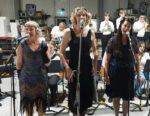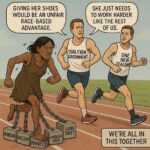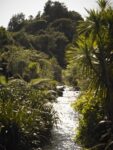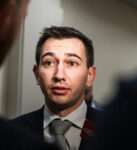By Dave Stewart, on May 30th, 2025 
It was a full house at Mata Beer last Saturday night when the EBOPers Big Band, featuring The Tequila Mockingbirds, put on a super-impressive performance. The EBOPers were formed out of the EBOP Brass Band in 2014, and are now established performers on the local circuit. . . . → Read More: Review: EBOPers impress
By Dave Stewart, on May 24th, 2025 
Here are some key takeaways from the Budget yesterday: Cuts to support for families Cuts to government contributions to KiwiSaver Theft of $12.8 billion from the lowest earning women Tax breaks to business Ongoing fossil fuel extraction with $200 million going into new gas exploration projects No commitments to ending child poverty . . . → Read More: What a wild week in politics it has been
By Dave Stewart, on May 6th, 2025 
Anne and Phillip lived 5 kms down the road. To give you an idea of what that meant, if I walked to their farm I passed 4 other houses. In those first couple of years I went there a lot. They looked after me. They rescued me. . . . → Read More: Meet Anne and Phillip of Waikaretu
By Dave Stewart, on April 11th, 2025 
For those who were unable to attend the Patient Voice Roadshow tonight I got permission off Malcolm Mulholland to record and publish the presentations of him, two nurses and the mayor. I stopped recording at Q & A. ======
Malcolm Mulholland is the chair of Patient Voice Aotearoa, a patient advocacy group. He is . . . → Read More: Malcolm Mulholland is the chair of Patient Voice Aotearoa, a patient advocacy group. He is taking his patient voice advocacy campaign to the people.
By Dave Stewart, on October 16th, 2023 
The only thing we can do about awful people is not to become one of them
Election night 2023 was a good night for the landlords, foreign speculators, and the very wealthy.
For tenants and people who mahi hard to keep afloat, not so much.
For those of us whose values include looking . . . → Read More: The only thing we can do about awful people is not to become one of them.
By Dave Stewart, on October 13th, 2023 
Voting Papers
I get asked a lot by people who I am voting for? And why?And who should they vote for.
Who I’m voting for is easy to answer.
I’m voting for Sebastian who lives opposite The Bean on the seats outside the public toilets.
I buy him a coffee when I . . . → Read More: Time To Vote
By Dave Stewart, on February 13th, 2023 
Dad had a lot of friends and we learned this as we went through our teens. we knew there were friends who came around and visited and there were his work friends and football club friends and friends from his other clubs and interests.
Dad asked all of them, all of them, to keep . . . → Read More: The Mad Butcher
By Dave Stewart, on February 12th, 2023 
Ian and Elaine with their some of their mokopuna
My dad did a trade when he was a young man. He became a bootmaker. But he couldn’t feed his kids on what he was making so he got a job at Hellaby’s Freezing Works in Otahuhu.
He worked hard and we never went . . . → Read More: Dad was a freezing worker.
By Dave Stewart, on August 2nd, 2022
No Right Turn I know a lot of people are concerned at the relentless volume and vitriol of the attacks and attempts to undermine our elected government.It was hard enough for them in 2017 when Winston responded to the Dirty Politics leaking of his super errors by National by forming a coalition with Labour . . . → Read More: No Right Turn
By Dave Stewart, on February 13th, 2022 
Source: https://www.newsroom.co.nz/hijacked-the-inside-story-of-how-nzs-convoy-lost-its-rudder
Days of protesters’ chats reveal the inside story of how New Zealand’s convoy was hijacked by the far-right fringe, Marc Daalder reports
Special report: The convoy wasn’t supposed to end this way.
What organisers hoped would be a mass movement shutting down the nation’s capital until vaccine mandates were removed has devolved into . . . → Read More: EXTREMISM: ‘Splintered realities’: How NZ convoy lost its way
|
Recent Posts
-
Tīpuna
-
Introducing Franklin To The World
-
MAGA: The Counter-Narrative
-
Bravo, Mr President. What’s the encore?
-
‘If I had the choice again, I would not fight in that war’ Tā Robert (“Bom”) Nairn Gillies
-
Follow the money – it’s enough to buy surgeons tropical cruises
-
Ian Taylor: Seymour’s rise to the second seat with power far beyond his mandate
-
Left bloc would have enough support to turf coalition government out of power – poll
-
‘I asked Queen Elizabeth II if she had any advice for me’: Jacinda Ardern on her time as a pregnant prime minister
-
‘Empathy is a kind of strength’: Jacinda Ardern on kind leadership, public rage and life in Trump’s America – The Guardian
-
Review: EBOPers impress
-
What a wild week in politics it has been
-
Meet Anne and Phillip of Waikaretu
-
The only thing we can do about awful people is not to become one of them.
-
Time To Vote
-
The Mad Butcher
-
Dad was a freezing worker.
-
No Right Turn
-
EXTREMISM: ‘Splintered realities’: How NZ convoy lost its way
-
Concert Review – Meat Loaf – Western Springs 14/03/2004
-
R.I.P Kevin Williams AKA Mojo Buzz – 1957 – 2021
-
National’s Train Wreck Continues
-
Anne Salmond: Covid-19 and clickbait
-
On The Media Collusion With National’s Attack Lines
-
Government reveals $72.5m racing industry Budget package
-
Yes Greta, there is a fascist clause.
-
Good Old Dad
-
Ihumatāo Land Protection
-
Herbs Release Anniversary Film
-
Annual Concert, 2019
-
Concert Review : Moone, Litt Park Theatre, Te Puke, September 28, 2018
-
Old Demos – Daddy Don’t Live In That New York City No More – Steely Dan
-
Solving The Photofinish Riddle
-
The Importance Of Being Eno
-
It’s Bigger Than Texas
-
Once Upon A Time…
-
Rewiring the telecaster
-
Wills Video
-
Vale Lou Reed
-
A Good Heart
-
Featherston Street Demos
-
Proud To Be A New Zealander?
-
“Not Another Love Song”
-
The Lunatics Have Taken Over The Asylum
-
Poorer Benefits For All
-
Ngati Stewart Gathering, June 2, 2013
-
Changing Gear
-
Let Me Tell You About Bernie
-
The Road Is The Goal
-
It’s Moments Like Those You Need Mintos
|








